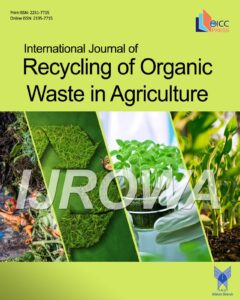
Purpose In the industrialized production of mushrooms usually only one flush of fruitbody is harvested, so that nutrients and energy in the substrate is not fully exploited. In this study, the spent Pleurotus eryngii substrate was recycled for the cultivation of Agrocybe chaxingu under ambient temperature. Method Six formulae were tested: (1) Control: 98% spent […]
Purpose The need for increasing production of Moringa oleifera in Nigeria can be achieved through adequate fertilization. This study investigated the effects of sources and rates of NPK (15:15:15) and compost on soil properties and productivity of Moringa at National Horticultural Research Institute, Ibadan, Nigeria. Methods NPK was applied at 30, 60, and 90 kg […]
Purpose To examine the effects of the application of composted sewage sludge fertilizer (commercially sold as Kala compost) and inorganic (NPK) fertilizers on soil quality and on two crops (radish and beans) irrigated using groundwater and sewage treated wastewater (TWW) for irrigation by measuring heavy metals in the soil and plants and other parameters such […]
Purpose Sewage sludge samples from a water treatment plant in Nigeria were subjected to an in-vessel composting (using sawdust as a bulking agent) and thermal sludge processing to improve its quality for agricultural applications. Methods Treated samples were analyzed for physicochemical and microbiological properties using standard analytical and aerobic culture protocols. Results Microbiological analysis of […]
Purpose Information on carbon dioxide (CO2) emission from different organic sources and their temperature sensitivity to decomposition is scarce in Bangladesh. Therefore, this study quantified the rates of CO2 emission and carbon (C) degradation constants from different organic material mixed soils at variable temperatures in two laboratory experiments. Methods The first experiment was conducted at […]
Purpose Urban municipal solid waste in India are 75–85% organic. Uncontrolled dumping of this waste is a major health concern. Degradation of organic waste by use of a microbial consortium is safe, efficient and economic. Therefore, this study was taken up to recycle the organic solid waste into effective compost using a microbial consortium. Methods […]
Purpose In a novel attempt, vermicompost derived from an intransigent and noxious weed salvinia was assessed for its fertilizer value and pest repellent properties. Methods In outdoor experiments which simulated the way vegetables are cultivated by farmers, ladies finger (Abelmoschus esculentus) seeds were germinated and grown in soil supplemented with salvinia vermicompost at four levels: […]
Purpose The aim of this research was to evaluate the suitability of pineapple waste for production of decomposable nursery pots. Methods The experiment was completely randomized, with three replicates and eighteen formula treatments. Treatments consisted of varying ratios of pineapple waste to binder, including 2:1, 1:0 (fresh pineapple waste), 1:1, 1:1.5, and 1:2; the textures […]
Purpose Current research focuses on the biological delignification of biomass by microbial laccase which is an environmentally friendly process. Methods Various statistical approaches were designed for optimization of laccase production like Plackett–Burman design as well as response surface methodology (RSM). A laccase mediator system was designed for the delignification of saw dust which was molecularly […]
Purpose The study evaluates and provides an overview of the nutritional importance of 19 selected food wastes as aids in human/livestock/soil/plant health. Methods Nitric acid-digested extracts of food wastes belonging to four different classes (fruits, vegetables, oilseeds and beverages) were analysed for different elements in an inductively coupled plasma mass spectrometer. Results Our study recommends […]